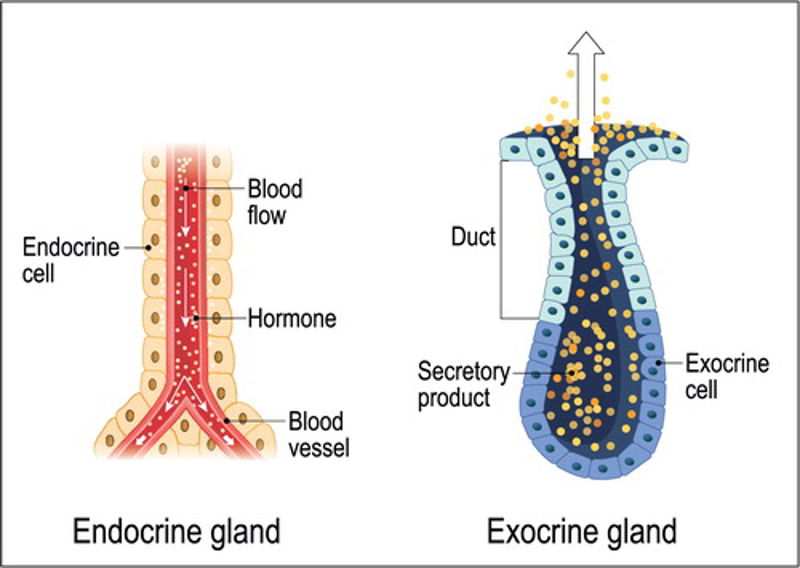Endocrine system: anatomy and associated disorders
The endocrine system is composed of several distinct glands and tissues, which are made up of specialised cells that synthesise, store and secrete hormones. Disturbance at any point in these complex processes or development of glands can result in disease.
Expand all
Collapse all
Overview
The endocrine system is composed of several distinct glands and tissues, which are made up of specialised cells that synthesise, store and secrete hormones. Hormones are chemical messengers that can act on nearby cells via interstitial fluid, on the cell of origin at a distant site or as neurotransmitters (Knight, 2021). Neurotransmitters crossing synapses contribute to the rapid actions of the nervous system. In contrast, endocrine effects tend to be slow to develop and result in prolonged responses potentially lasting weeks, as hormones travel in the bloodstream.
Hormones control a wide range of physiological processes including growth, metabolism, sleep, immune system response, ‘fight or flight’, reproduction, mood and behaviour (Feather et al, 2021). They also assist in maintaining homeostasis by regulating the body’s internal environment in response to changes in the external environment. The human body produces over 100 hormones, and research is enabling greater understanding of their functions and
To view the rest of this content login below; or read sample articles.
Anatomy and physiology
Endocrine and exocrine glands
All glandular tissues produce secretions. Exocrine glands are arranged so that they secrete via a central duct, which directs the secretions to the desired location (eg sweat from glands in the skin) (Khan et al, 2022). Alternatively, endocrine glands release their secretions into the bloodstream, so they feature a rich blood supply to ensure efficient transport of their hormones around the body and enable them to continuously monitor blood for changes that initiate hormone secretion (Fox et al, 2015) (Figure 1).

The hypothalamus is a part of the brain that releases several hormones, which affect other endocrine glands’ hormone production, acting as the endocrine control centre and linking the nervous system with the endocrine
To view the rest of this content login below; or read sample articles.
Aetiology of disorders
Disturbance at any point in these complex processes or development of these glands can result in disease. Endocrine disorders largely result from too much or too little hormone secretion. This hormonal imbalance may be because of:
- problems with the endocrine feedback system
- genetic disorder
- infection
- injury or disease of the endocrine gland
- growth of nodules or tumours in the glands (Feather et al, 2021)
For example, in Cushing’s disease the negative feedback loop is disturbed, causing excessive production of adrenocorticotropic hormone (a pituitary hormone) as it is not inhibited by excessive cortisol, resulting in symptoms such as central obesity and high blood pressure. Ageing also lessens the endocrine system’s functioning, as the secretion of several hormones is reduced, along with the sensitivity of target cells to the hormones produced. Examples include:
- falling oestrogen levels triggering menopause
- decreasing growth hormone causing loss of muscle mass
- declining melatonin levels disturbing sleep
- insulin
To view the rest of this content login below; or read sample articles.
Case study
Presenting complaint
Ms Singh presented to her GP surgery after a week of severe itching (pruritus) and noticing thick white vaginal discharge.
Social history
Ms Singh is a 56-year-old woman of South Asian heritage, who lives with her husband, mother and children in an urban terraced house. She does not smoke or drink alcohol. Her husband has no genital symptoms, and she has had no new sexual contacts in the last 30 years. Her brother and mother have been diagnosed with diabetes mellitus.
Prior medical history
- recent episodes of thrush (three in the past 6 months)
- recent urinary tract infections (three in the last 6 months)
- reports feeling increasingly tired, gained weight in the last 12 months
Subjective and objective assessment
- Ms Singh has obesity, with a body mass index of 36.4 kg/m2
- A sample of her vaginal discharge, which is thick, white and cottage-cheese like, has been sent for
To view the rest of this content login below; or read sample articles.
NMC proficiencies
Nursing and Midwifery Council: standards of proficiency for registered nurses
Part 1: Procedures for assessing people’s needs for person-centred care
2.6 accurately measure weight and height, calculate body mass index and recognise healthy ranges and clinically significant low/high readings
2.10 measure and interpret blood glucose levels
Part 2: Procedures for the planning, provision and management of person-centred nursing care
11.1 carry out initial and continued assessments of people receiving care and their ability to self-administer their own medications
To view the rest of this content login below; or read sample articles.
Resources
Andrade M, Bayram-Weston Z, Knight J. Endocrine system 4: adrenal glands. Nursing Times. 2021;117(8):54–58.
Donald M, Kahlon BK, Beanlands H, et al. Self-management interventions for adults with chronic kidney disease: a scoping review. BMJ Open. 2018;8(3):e019814. https://doi.org/10.1136/bmjopen-2017-019814
Feather A, Randall D, Waterhouse M. Kumar and Clark’s clinical medicine. 10th edn. London: Elsevier; 2021
Fox T, Brooke A, Vaidya B. Eureka: endocrinology. 1st edn. London: Scion Publishing; 2015
Goff LM. Ethnicity and Type 2 diabetes in the UK. Diabet Med. 2019;36(8):927-938. https://doi.org/10.1111/dme.13895
Khan S, Fitch S, Knox S, Arora R. Exocrine gland structure-function relationships. Development. 2022;149(1):dev197657. https://doi.org/10.1242/dev.197657
Klubo-Gwiezdzinska J, Wartofsky L. Hashimoto thyroiditis: an evidence-based guide to etiology, diagnosis and treatment. Pol Arch Intern Med. 2022;132(3):16222. https://doi.org/10.20452/pamw.16222
Knight J. Endocrine system 1: overview of the endocrine system and hormones. Nursing times. 2021;117(5):38-42.
Knight J, Andrade M, Bayram-Weston Z. Endocrine system 3: thyroid and parathyroid glands. Nursing times. 2021;117(7);46-50
National Institute for Health and Care Excellence. Thyroid disease: assessment and management. 2023.
To view the rest of this content login below; or read sample articles.